- Home
- Raymond E. Feist
Into a Dark Realm: Book Two of the Darkwar Saga Page 4
Into a Dark Realm: Book Two of the Darkwar Saga Read online
Page 4
For years Pug had kept the secret of this box, a device that allowed him to send notes to himself from the future. Occasionally he pondered the device, studying it at leisure, for he knew eventually he must unravel its secret. There could be no other explanation than that he was sending himself messages.
Eight times in the intervening years he had opened the box to discover a new message inside. He didn’t know how he knew, but when a message arrived he sensed it was time to open the box once more.
One message had said, “Trust Miranda.” It had arrived before he had met his wife, and when he first encountered her, he realized why he had sent the message. She was dangerous, powerful, and willful, and at the time, an unknown.
Yet even now he still didn’t completely trust her. He trusted her love for him and their sons; and her commitment to their cause as well. But she often had her own agenda, ignoring his leadership and taking matters into her own hands. For years she had agents working for her in addition to those working for the Conclave. She and Pug had endured several heated arguments over the years, and several times she had agreed to keep her efforts confined within the agreed-upon goals and stratagems of the Conclave, yet she always managed to do as she pleased.
He hesitated. Whatever was in that parchment was something he needed to know, yet something he dreaded knowing. Nakor had been the first person he had told of the messages—just in the last year—though the box was still known only to Pug. Miranda thought it merely a decorative item.
As he began to unroll the parchment Pug wondered, and not for the first time, if these messages were to ensure that a certain thing happened, or to keep something terrible from happening. Perhaps there was no distinction between the two.
He looked at the parchment. Two lines of script in his own handwriting greeted him. The first said, “Take Nakor, Magnus, and Bek, no others.” The second said, “Go to Kosridi, then Omadrabar.”
Pug closed the box and sat down behind his desk. He read the note several times, as if somehow he might discern a deeper meaning behind those two simple lines. Then he leaned back, sipping at his drink. Kosridi he recognized as the name of the world shown in a vision to Kaspar of Olasko by the god Ban-ath; it was one of the worlds upon which resided the Dasati. Where lay Omadrabar, he had not even an inkling. But he knew one thing: somehow he had to find a way into the second realm of existence—to the plane of reality to which no one from this reality, to the best of his knowledge, had ever ventured. From there, somehow, he and his companions must make their way to the Dasati world of Kosridi, and from there to this Omadrabar. And if he was certain of nothing else, he was certain that this Omadrabar would be the most dangerous place he had ever visited.
THREE
AFTERMATH
Kaspar reined in his horse.
He fought back worry. This was a hard land and he felt a stab of apprehension as to what might be waiting for him. He had considered the little farm something close to a home for months after beginning his exile in this land, and Jojanna and her son Jorgen had been as close to family as any people he had known.
It had taken no more than a glance for him to know the farm had not been inhabited for some time, at least a year from the look of things. The pasture was overgrown and the fence was knocked down in several places. Before Jojanna’s husband, Bandamin, had disappeared they had raised a few steers for the local innkeeper. The corn patch and small wheat field were both choked with weeds and the crops had gone to seed.
Kaspar dismounted and tied off his horse to a dead sapling. The tree had been planted after he had left, but had since died from neglect. He glanced around out of habit: whenever he considered the possibility of trouble, he always made a survey of the surroundings, noting possible places of ambush and escape. He realized there probably wasn’t another living human being within a day’s walk in any direction.
Entering the hut, he was relieved to see no sign of struggle or violence. All of Jojanna’s and Jorgen’s personal belongings, scant though they may have been, were gone. The departure had been orderly. He had feared bandits or wandering nomads might have done harm to his…what? Friends?
Kaspar’s life had been one of privilege and power, and many people had sought him out, currying favors, begging protection, or seeking some advantage, but until he had been deposited in this distant land by Magnus, the former Duke of Olasko had had few he could name “friend,” even as a child.
He had terrorized Jojanna and Jorgen for two days before he could make them understand he had not come to this little farm to harm them; he was merely a stranger in need of food and shelter and he worked hard to pay for his keep. He had negotiated a more favorable trade with a local merchant on their behalf and had left them in a better situation than he had found them. When he departed to begin his long journey home, he thought of them as friends; possibly even more than friends…
Now, three years later, Kaspar was back in Novindus. He had been watching the secret cache of Talnoy, providing a sword against more mundane threats to the ten thousand apparently sleeping killing machines, if indeed a machine slept. Two magicians—an older man named Rosenvar and a youth named Jacob—were investigating some aspect or another of their nature, following instructions left by Pug and Nakor.
Nakor had briefly returned with his companion, Bek, to inform the magicians he would be absent longer from his pet undertaking, finding a safe means of controlling the army of Talnoy. Kaspar found the magical aspect of these discussions mind-numbing, but he had greeted the news of the imminent obliteration of the Nighthawks with anticipation.
When Nakor made ready to depart, Kaspar asked him to request someone to come guard the two scholars as he had some personal business he wished to take care of in Novindus before returning to Sorcerer’s Isle. Nakor had agreed, and as soon as another had been dispatched to guard the magicians, Kaspar had begun his journey southward.
Lacking the magical devices employed by other members of the Conclave, Kaspar had to endure two weeks’ travel. The closest town to the caves where the Talnoy were hidden was Malabra, and from there the road south became more well traveled. He rode his horses to near exhaustion, trading mounts twice in the towns along the way. Twice more he had outrun bandits and three times he had endured the scrutiny of local soldiers, two of the encounters ending in bribery.
Now he felt a sense of futility. He had hoped to find Jojanna and Jorgen, though he was unsure of what he wished once he found them. He had been exiled to Novindus as punishment for his part in the destruction of the Orosini people and his plots against his neighboring nations. He had somewhat redeemed himself in the eyes of his former enemies by bringing word of the Talnoy to the Conclave, and had been fully forgiven after his role in foiling the Nighthawks’ plot against the throne of the Empire of Great Kesh. But he had a lingering sense of obligation toward Jojanna and Jorgen, and to Kaspar an unpaid debt was a canker that became more inflamed as time passed. He wanted to see that the pair of them were safe, and leave them with enough wealth to ensure they’d live well for the rest of their lives.
The small purse of coins he carried made him a wealthy man in this land. He had traveled the roads of the Eastlands before, on foot and by wagon, and had seen the conditions lingering after the great war of the Emerald Queen, a land still struggling to recover even thirty years after the war. Coins of copper were rare, silver almost never seen, and even a single gold coin was worth a man’s life. Kaspar had enough gold on him to hire a tiny army and set himself up as a local noble.
He left the hut and considered what to do next. He had ridden straight through the village of Heslagnam as he made his way to the farm, and it was on his way back to the Talnoy cave. He would reach it after sundown—it had taken them two days and half a morning to walk there the first time he had journeyed there from the farm—and while the inn was nothing worth noting, it was serviceable, and he had slept in far worse over the last three years.
He pushed his horse and arrived at the village of Heslagnam shortly after
darkness had fallen. The ramshackle wooden inn was as he remembered it, though it looked as if it might have had a new coat of whitewash; in the dark it was difficult to tell.
When no one appeared as he rode into the stabling yard, he untacked his horse and rubbed it down. By the time he was finished, he was tired, irritated, and in sore need of what passed for a drink in this part of the world.
Kaspar walked around to the front door of the inn, and pushed it open. The inn was unoccupied save for two villagers who sat at a table opposite the fireplace and the owner of the inn, a thick-necked man by the name of Sagrin, who stood behind the bar. Kaspar walked up to the bull-necked man, who regarded him closely.
Sagrin said, “I don’t forget faces, even if I can’t recall a name, and I’ve seen you before.”
“Kaspar,” answered the former duke, removing his gloves. “I’ve got a horse out back. Where’s your lackey?”
“Don’t have one,” answered Sagrin. “No boys in town. All dragged off to serve in the war.”
“What war?”
“Who knows? There’s always a war, isn’t there?” He hiked his thumb over his shoulder, in the general direction of the stabling yard. “You can shelter your horse for free, seeing as I’ve got no one to care for it, but you’ll have to buy your own feed at Kelpita’s store across the way in the morning.”
“I’ve oats in my pack. I’ll care for the horse before I turn in. What have you to drink?”
“Ale and some wine. If you know wine, take the ale,” said the innkeeper.
“Ale, then.”
The ale was produced and Sagrin squinted a bit as he eyed Kaspar. “You were here, what? Two years back?”
“Closer to three.”
“Can’t quite place it…”
“If you sit on the floor and look up at me, you might remember,” said Kaspar. He took a drink. The ale was as he remembered it, thin and without much to recommend it, but it was cool and wet.
“Ah,” said Sagrin. “You’re the bloke who came in with Jojanna and her kid. Dressed a fair bit better these days.”
“Right,” said Kaspar. “Are they around?”
Sagrin shrugged. “Haven’t seen Jojanna for over a year.” He leaned forward. “The boy run off and she was nearly frantic and went looking for him, I guess. Sold off her cattle and mule to Kelpita, then found a trader heading south—said he’d take her on for a fee.” Sagrin shrugged, but his tone was regretful. “She’s probably buried under some rocks a day or two south of here.”
“Jorgen ran off?” asked Kaspar. He knew Jojanna and her son well enough to know that the boy was devoted to his mother, and he couldn’t imagine any reason why Jorgen would run away from home.
“Some crew came through and word got back to the farm that the boy’s dad was serving with a company of soldiers out of Higara—seems Bandamin got himself impressed by a company of…well, they’d be slavers no matter what they called themselves, but as they were selling those who were captured into the army of Muboya, they called themselves ‘recruiters.’”
Kaspar remembered a relatively pleasant supper with a general of a brigade who was cousin to the Raj of Muboya. If Kaspar could find him he could…what? Arrange to have him discharged?
“How goes that war?” asked Kaspar.
“Last I heard Muboya had forced Sasbataba to surrender, and was now battling some bandit lord named Okanala for control of the next bit of land he wants.
“I’ll give the boy Raj credit though: after his army leaves, the lands left behind are almost as quiet as they were before the Emerald Queen’s war. Wish he’d send some of his lads up this way to calm things down between here and the Hotlands.” Seeing Kaspar’s mug was empty, Sagrin said, “Another?”
Kaspar pushed himself away from the bar. “In a while. First let me feed my horse and make sure there’s adequate water.”
“Staying?”
Kaspar nodded. “I’ll want a room.”
“Pick any one you like,” said Sagrin. “I’ve got lamb on the spit and the bread was baked yesterday.”
“That’ll be fine,” said Kaspar. He left the common room.
Outside the night air was cool; it was winter in this land, but he was far enough north and close enough to the Hotlands that it never got truly cold. He went to the stable and got a bucket, filled it at the well, and made sure the trough was full. He put a nosebag on his horse and took some time to inspect the animal. He had ridden it hard and he wanted to make sure the gelding was sound. He saw an old currying brush sitting on the shelf next to some worthless old tack, and he picked it up and started brushing the horse’s coat.
As he curried, Kaspar became lost in thought. Part of him had wanted to return here, to build a new personal empire; but these days the stirrings of ambition were muted in his heart. But they were never gone entirely. Whatever effect the influences of the mad sorcerer Leso Varen had been on Kaspar, the former ruler of Olasko’s basic nature was still ambitious.
The men who were bringing order out of chaos on this continent were men of vision as well as desire. Power for its own sake was the height of greed; power for the benefit of others had a nobler quality he had only just begun to appreciate as he observed men like Pug, Magnus, and Nakor, men who could do amazing things, yet only sought to make the world a safer place for everyone.
He shook his head at the thought, realizing that he had no legal or ethical foundation for building an empire here; he would just be another self-aggrandizing bandit lord carving out his own kingdom.
He sighed as he put away the currying brush. Better to find General Alenburga and enlist in the Raj’s service. Kaspar had no doubt he would quickly win promotion and have his own army to command. But could he ever take service in another man’s army?
He stopped, and started to laugh. What was he doing now? He was serving the Conclave, despite the fact he had never taken a formal oath of service with any of them. Since bringing Pug and his companions word of the Talnoy and the threat Kalkin had shown him of the Dasati homeworld, Kaspar had been running errands and carrying out missions for the Conclave.
Still chuckling as he reached the door to the inn, Kaspar decided that he was serving this land, as well as the rest of the world, and his days as a ruling lord were over. As he pushed open the door he thought: at least life was interesting.
Ten days later, Kaspar walked his horse through the crowded streets of Higara. The town had changed in the last three years; everywhere he saw the signs of prosperity. New construction was turning this town into a small city. When he had last passed through Higara, it had been a staging area for the Raj of Muboya’s army as they readied an offensive southward. Now the only men in uniform to be seen were the town’s constables. Kaspar noted they wore colors that resembled the regular army’s, a clear indication that Higara was now firmly part of Muboya, no matter its previous allegiances.
Kaspar found the very inn where he had spoken to General Alenburga three years previously, and saw it had been restored to its former tranquillity. Instead of soldiers everywhere, a boy ran out of the stable to take charge of Kaspar’s horse. The boy was roughly the same age as Jorgen had been when Kaspar had last seen him, reminding him of why he was making this trek. Putting aside a growing sense of futility in finding one boy and his mother in this vast land, Kaspar handed the boy a copper coin. “Wash the road dirt off and curry him,” he instructed. The boy grinned as he pocketed the coin and said he would.
Kaspar entered the inn and glanced around. It was crowded with merchants taking their midday meal and others dressed for travel. Kaspar made his way to the bar and the barkeep nodded. “Sir?”
“Ale,” said Kaspar.
When the mug sat before him, Kaspar produced another copper coin and the barman picked it up. He hefted it, quickly produced a touchstone, struck the color of the coin, then said, “This will do for two.”
“Have one for yourself,” said the former duke.
The barman smiled. “Little early for me.
Maybe later. Thanks.”
Kaspar nodded. “Where’s the local garrison these days?”
“Don’t have one,” said the barman. He pointed in the general direction of the south road. “There’s a garrison down in Dondia, a good day’s ride. They pulled all the soldiers out of here when Sasbataba surrendered. We get a regular patrol up here once a week, and there’s a company of town militia to help the constables if needed, but frankly, stranger, things around here are quiet to the point of being downright peaceful.”
“Must be a welcome change,” said Kaspar.
“Can’t argue about that,” said the barman.
“Got a room?”
The barman nodded and produced a key. “Top of the stairs, last door on the left. Got a window.”
Kaspar took the key. “Where’s the local constable’s office?”
The barman gave Kaspar directions, and after finishing his ale and an indifferent lunch of cold beef and barely warm vegetables, Kaspar headed to the constable’s office. Walking the short distance, he was assailed by the sounds and sights of a bustling trading center. What ever the previous status of Higara, it was now clearly a regional hub for the expanding territory. For a brief moment Kaspar felt a twinge of regret; Flynn and the other traders from the Kingdom would have found the riches they sought in such a place as this. The four traders from the Kingdom of the Isles had been responsible for Kaspar’s coming into possession of the Talnoy, each of them dying ignorant of the part he had played.
Thinking of that infernal device, Kaspar wondered if he should set himself a limit on how long he’d look for Jojanna and Jorgen.
He found the constable’s office easily, and pushed open the door.
A young man wearing a tunic with a badge looked up from a table that served as a desk. With the air of self-importance that only a boy recently given responsibility could manage, he said, “What can I do for you?”
“I’m looking for someone. A soldier named Bandamin.”

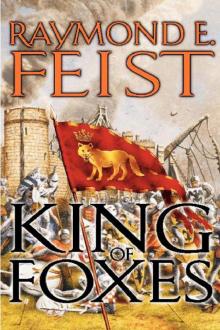 King of Foxes
King of Foxes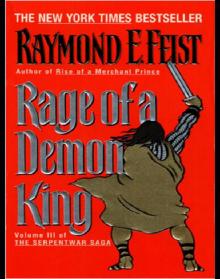 Rage of a Demon King
Rage of a Demon King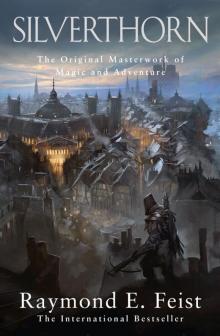 Silverthorn
Silverthorn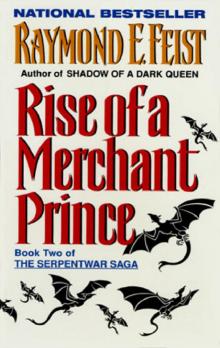 Rise of a Merchant Prince
Rise of a Merchant Prince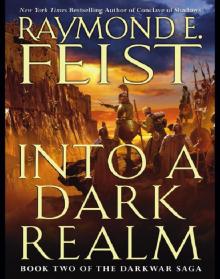 Into a Dark Realm: Book Two of the Darkwar Saga
Into a Dark Realm: Book Two of the Darkwar Saga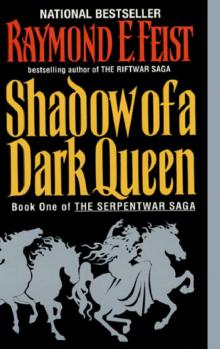 Shadow of a Dark Queen
Shadow of a Dark Queen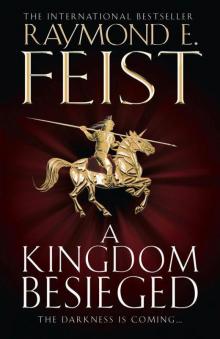 A Kingdom Besieged
A Kingdom Besieged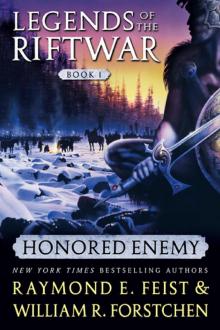 Honored Enemy
Honored Enemy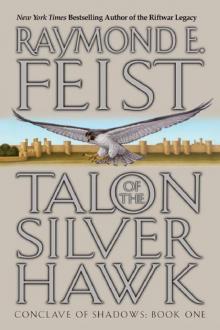 Talon of the Silver Hawk
Talon of the Silver Hawk The Complete Legends of the Riftwar Trilogy
The Complete Legends of the Riftwar Trilogy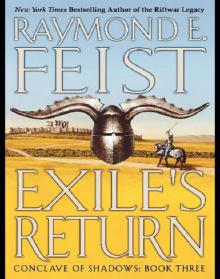 Exile's Return: Conclave of Shadows: Book Three
Exile's Return: Conclave of Shadows: Book Three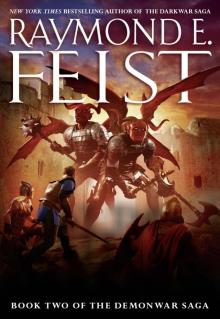 At the Gates of Darkness
At the Gates of Darkness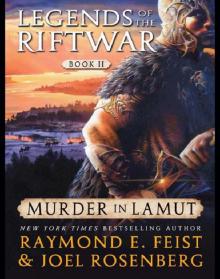 Murder in LaMut: Legends of the Riftwar: Book II
Murder in LaMut: Legends of the Riftwar: Book II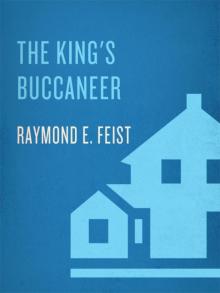 The King's Buccaneer
The King's Buccaneer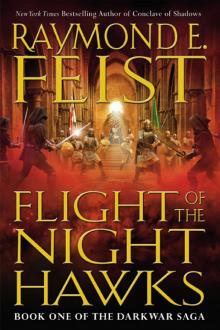 Flight of the Nighthawks
Flight of the Nighthawks The Riftwar Saga
The Riftwar Saga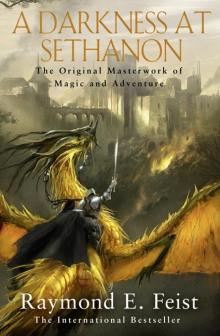 A Darkness at Sethanon
A Darkness at Sethanon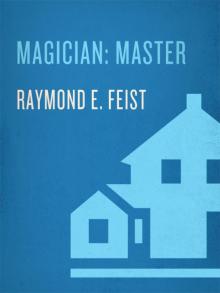 Magician: Master
Magician: Master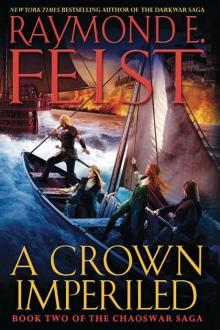 A Crown Imperiled
A Crown Imperiled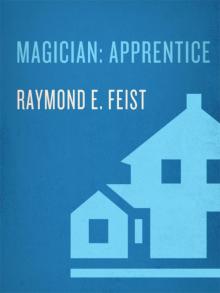 Magician: Apprentice
Magician: Apprentice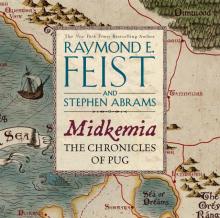 Midkemia
Midkemia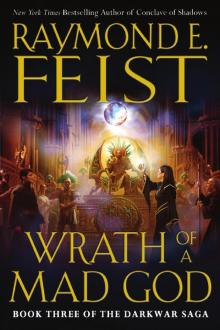 Wrath of a Mad God
Wrath of a Mad God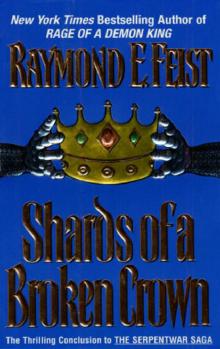 Shards of a Broken Crown
Shards of a Broken Crown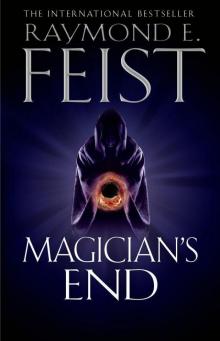 Magician's End
Magician's End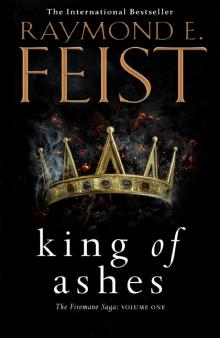 King of Ashes
King of Ashes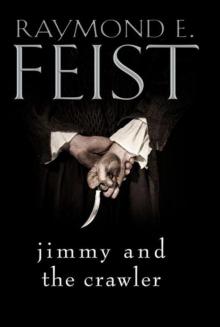 Jimmy and the Crawler
Jimmy and the Crawler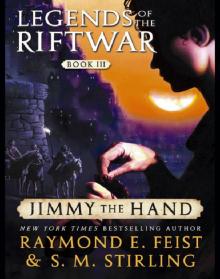 Jimmy the Hand: Legends of the Riftwar, Book 3
Jimmy the Hand: Legends of the Riftwar, Book 3 Queen of Storms
Queen of Storms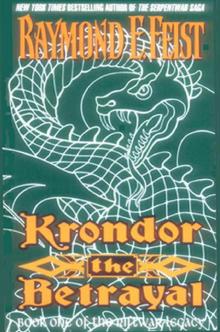 Krondor: The Betrayal
Krondor: The Betrayal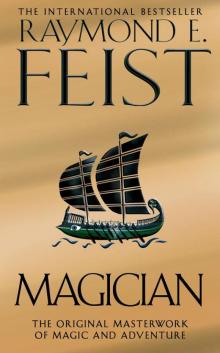 Magician
Magician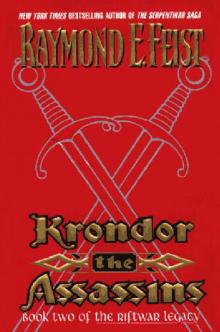 Krondor: The Assassins
Krondor: The Assassins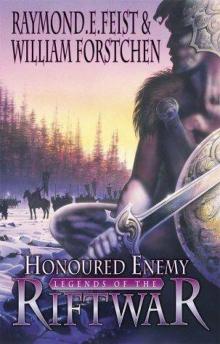 Honoured Enemy
Honoured Enemy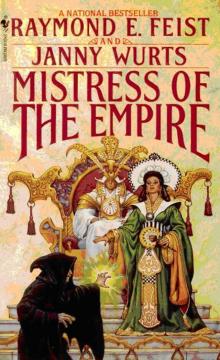 Mistress of the Empire
Mistress of the Empire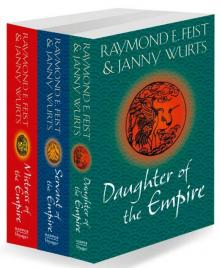 The Complete Empire Trilogy
The Complete Empire Trilogy Legends 1 - Honoured Enemy
Legends 1 - Honoured Enemy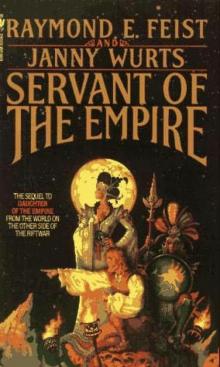 Empire - 02 - Servant Of The Empire
Empire - 02 - Servant Of The Empire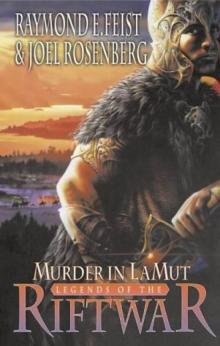 Murder In LaMut
Murder In LaMut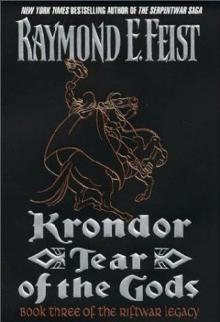 Krondor Tear of the Gods
Krondor Tear of the Gods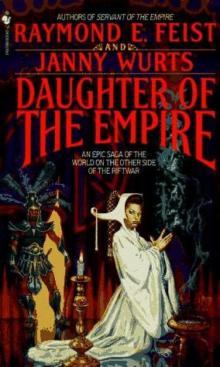 Empire - 01 - Daughter Of The Empire
Empire - 01 - Daughter Of The Empire![King of Ashes [Book One] Read online](http://i1.bookreadfree.com/i1/03/30/king_of_ashes_book_one_preview.jpg) King of Ashes [Book One]
King of Ashes [Book One]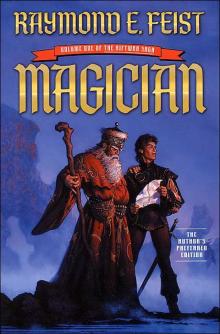 Magician (10th Aniversary Edition)
Magician (10th Aniversary Edition) Prince of the Blood, the King's Buccaneer
Prince of the Blood, the King's Buccaneer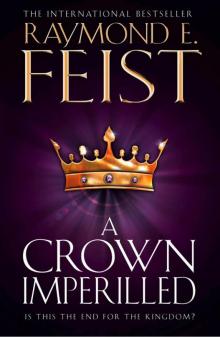 A Crown Imperilled cs-2
A Crown Imperilled cs-2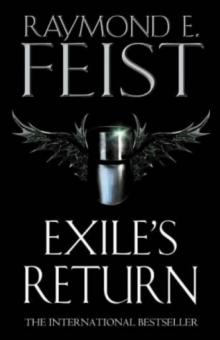 Exile's Return
Exile's Return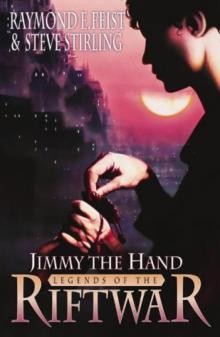 Jimmy the Hand
Jimmy the Hand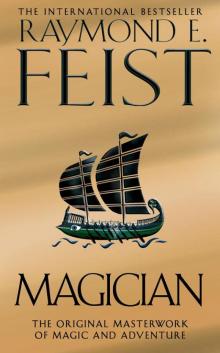 Book 1 - Magician
Book 1 - Magician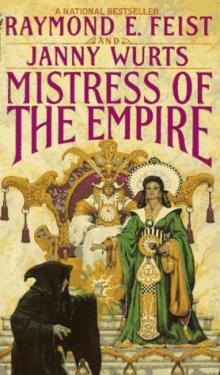 Empire - 03 - Mistress Of The Empire
Empire - 03 - Mistress Of The Empire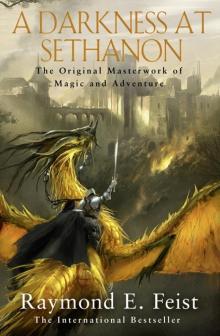 Darkness at Sethanon
Darkness at Sethanon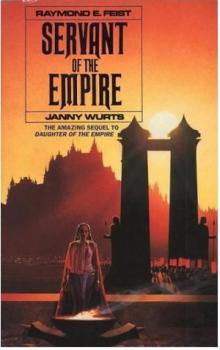 Servant of the Empire
Servant of the Empire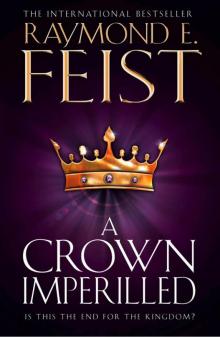 A Crown Imperilled
A Crown Imperilled Rides a Dread Legion
Rides a Dread Legion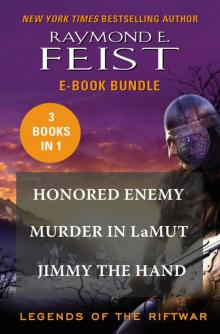 Legends of the Riftwar
Legends of the Riftwar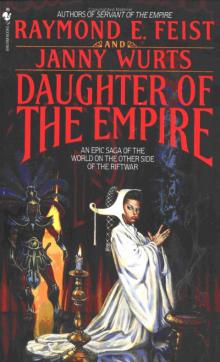 Daughter of the Empire
Daughter of the Empire The Riftwar Saga Trilogy: Magician, Silverthorn and A Darkness at Sethanon
The Riftwar Saga Trilogy: Magician, Silverthorn and A Darkness at Sethanon